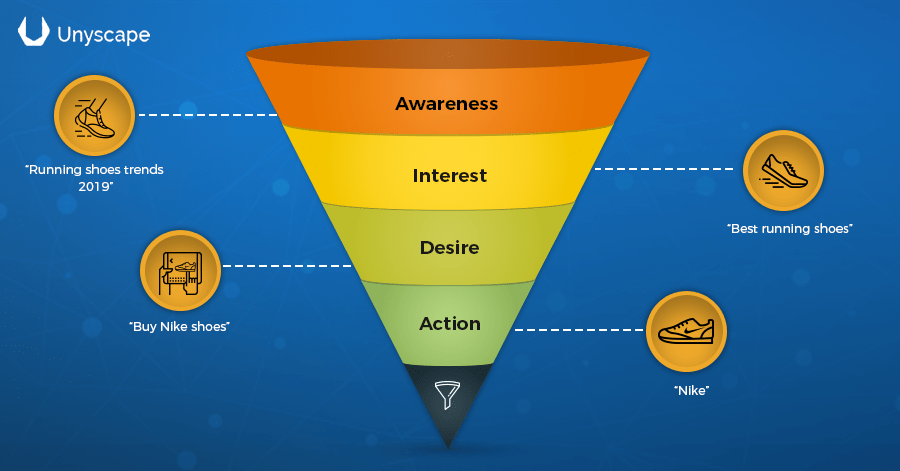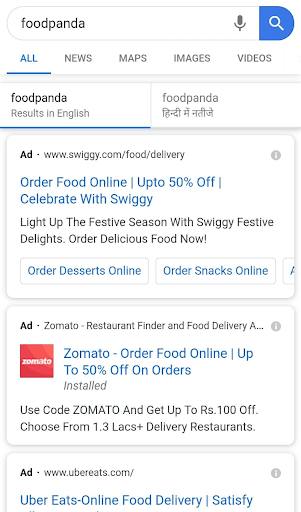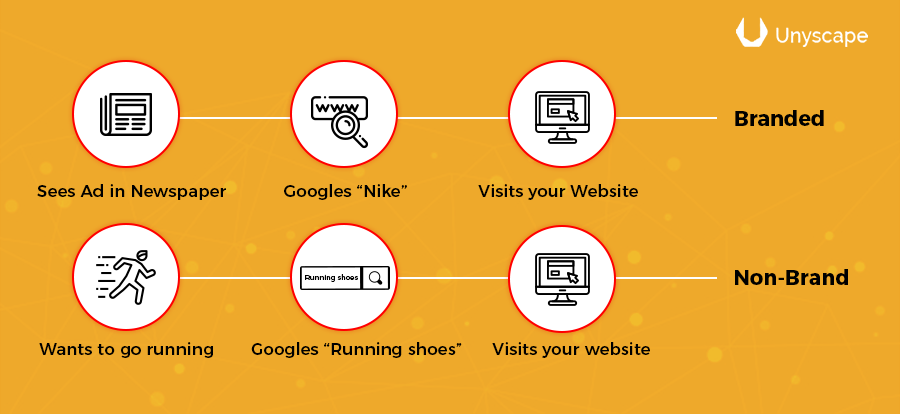
Branded vs Non Branded Queries – Know the difference & Importance
Posted on 14.04.2022 / a 12min. read
Table of Contents
100 new visitors from Branded queries or 1000 new visitors from non-branded queries? Which one would you choose? Most wouldn’t bat an eye before they choose branded, mainly because of the conversion rate, but most importantly, because of the very clear intent of the user. However, this is an ideal situation that hardly exists. Things are never this easy, right? To get such impactful results we need to structure our campaigns around specific keywords that reach the right audiences. As a part of your digital marketing initiatives (SEO and Paid), it’s important to determine the portion of the brand and non-brand traffic on your website. Why?
This would help you:
- Monitor performance and optimize your website to perform better
- Decide on the course of action for your branding efforts and reputation management.
- Reach your potential audience through non-branded searches.
- Ultimately, optimize traffic and leads to better chances of conversions.
Before we divulge into how we can break down the traffic from branded and non-brand queries, let’s first understand these terms.
What are Branded Queries?

As the name suggests, these queries contain the band name as a part of the keyword. Brand, product and domain name searches fall under this category. These types of queries also include a physical location that is attached to the brand name.
For the brand Nike, branded queries would include someone typing:
- Nike
- nike.in
- Nike + Product (Nike Air Max 200)
- Nike + Location (Nike New Delhi)
- Nike + Keyword (Nike Shoes for men)
Navigational Queries
Branded queries are extremely valuable because they come with a very clear intent of the user. He knows exactly where he wants to go, and on what site he wants to land. So, if your site is not ‘the site’, the chances of getting noticed (and subsequently leading to a click) are very slim.
Branded navigational queries (Nike or nike.in) are sometimes classified as ‘go queries’ by Google. Go queries get special treatment on the SERP. In fact, in some instances, the total number of search results that appear on the SERP is reduced to add richer results like brand Knowledge Panels, Onebox and even Google Maps listing.
It’s possible that in some instances, although the query might seem like a navigational query, it might actually be an informational query. For instance, if the user types Linkedin on the search box, he might be looking for some news on Linkedin rather than the site itself. Google knows this, that’s why you see the top stories appearing on the results page.
What are Non-Branded Queries?
These are definitely a tougher nut to crack. Users aren’t specifically searching for your brand, but they are searching for the products and services that you offer. Such queries can further be classified into topic queries or intent queries and they can both be informational or transactional in nature.
‘Know’ and ‘Do’ are the biggest driving factors for users to use such queries. These are people who:
- Are looking for answers or doing general research, or
- Wants to learn something, or
- Have a product or services in mind, or
- Comparing two solutions to determine which is better.
Therefore, in case you’re selling a particular product or service, you not only want to identify a specific topic based on your brand, products or services; but also want to target queries based on both research and purchase intent.
Informational Queries
Interestingly, research shows that almost 80% of all the searches fall into this category. The user is just looking for a piece of information and is not really having a purchase intent. And so, there could be 1000s of relevant results for such queries, meaning, there’s high competition. It’s a known fact that these queries are hard to monetise, so what’s the point? They are extremely valuable in cultivating leads. And, we all want leads!
Perhaps the best way to capitalise these queries is through SEO, with high-quality, unique content that has authority. You can genuinely provide valuable content through Blogs, How-to videos, guides and infographics. The key is to creatively position your content as one of trust and quality, rather than cramming it down people’s throats.
Transactional Queries
People who are looking to make a purchase use these queries. Usually, such queries contain terms like buy or purchase. This is great, because they are at the end of the funnels, just right for the picking. While working on these queries, though SEO makes sense, the maximum value is extracted through paid ads. Since it’s practically impossible for everyone to rank on organic, paid ads would definitely give you that boost.
The Value of Tracking Branded Queries

As a part of your SEO and PPC, you would want your branded queries to perform well on Google (organic search). Simply because, if a user is looking for you and if you aren’t among the top results, you are leading them to your aggregators or worse, your competition. Many businesses also want to extract maximum value from their branded queries on Google Ads and thus, pump more money into it because they want the top organic spot and the top sponsored spot. Let’s look at how your business can benefit.
Direct Traffic from Branded Queries
Most people prefer to use Google Search as opposed to typing the URL on the browser bar. For instance, if I want to visit Facebook I would find it much easier to use Google Search. This is why it is important to track branded keywords, to know how much traffic this amounts to. This would help you better your SEO efforts by measuring the impact and optimising accordingly.
Product Queries
For businesses that have multiple products or service offerings, it becomes essential to know if your customers are searching for your specific products and what they are searching about it. This not only helps you with SEO but also becomes a part of your social listening to better optimise your customer’s experience with your brand. For instance, they might be looking for support or help and you can accordingly curate content and resources to address such searches.
Local Branded Queries
Many businesses look to optimise they searchability within their communities. For instance, a baker in New York would want to be found by people in and around that area. The same can be said for big businesses with local offerings. Since Google’s algorithms can identify implicit local searches (the algorithm identifies the user’s locations and suggests location-based results) and explicit local searches (brand name + location like The Cheesecake Factory New York), it becomes important to monitor and optimise local branded queries.
The Value of Tracking Non- Branded Queries
Non-branded searches are largely undervalued because people don’t always know what they are looking for while they search for related queries. Without the right perspective, data is just a bunch of numbers, and the visualization is blurry. On face value, these queries might look like they have a low RoI, however, once a user reaches your website through non-branded queries and is convinced by your product, it’s likely that he’ll become a repeat purchase. The fact of the matter is that the value of non-branded queries marinates over time and gradually affects user behaviour. Here are a few examples of why you should be tracking non-branded keywords.
Mobile Search
Mobile and voice search has changed the way people are searching for things around them. They look for instant answers, suggestions and gratification. And, you rarely find people using branded keywords for this because, the urgency outweighs brand loyalty. When you are driving, you quickly search for ‘petrol stations near me’, and when you have a midnight craving for ice-creams you would type ‘ice-creams parlours open now’. A lot of implicit and explicit local search queries contain non-brand keywords, and thus, becomes valuable for your business.
Building Online Visibility
Every business wants to grow and gain better visibility. Non-branded keywords let new customers reach you and are ideal for bringing more traffic to your website. You want to present your business as a solution for problems people are facing or needs they want to be met.
Increased Potential
Suppose you are in the business of selling shoes. Imagine that out of 10 people looking to buy shoes, only 1 knows your brand. So, when you use branded keywords you connect that one person pushing them towards a sale. But, what about the other 9 people? That’s the issue with only optimising your business for branded keywords – you miss out on so much potential. A combination of non-branded keywords is equally important to take charge of the market potential.
Branded vs Non-Branded – Which is better?

Despite having dissected the two, even the greatest marketers out there cannot say that focusing on one is better than the other. It’s not fair to compare branded and non-branded queries in general terms. However, based on a business’ specific objective, a particular approach might prove to be better. Here are a few such instances:
Non-branded: Increase visibility
As mentioned earlier, non-branded queries help your business gain visibility because of the high search volume for them. It’s said that two-thirds of the searches are all non-branded in nature. Therefore, if you have the following goals in mind, you can give priority to non-branded queries.
- Visibility in SERP
- Increased brand awareness
- Increased traffic
Branded: Beats Competition
Since non-branded queries are not specific, thousands of companies that offer products and services that are similar to yours might be trying to compete with you. And, beating the competition becomes difficult. However, your brand is unique and ranking on brand would help you navigate through the competition.
Branded: Better Conversions
Branded keywords have higher conversion rates than non-branded keywords. Since every company ultimately wants to increase sales and revenues, focusing on branded keywords would give you such results.
Closing Thoughts
From a best practices perspective, following just one of this would not be ideal. For instance, users who are using branded keywords might be ready to convert or buy your product. However, they could have initially found you through non-branded keywords and then used branded keywords to find out more about you. That’s why it is important to optimize both these types of keywords.
